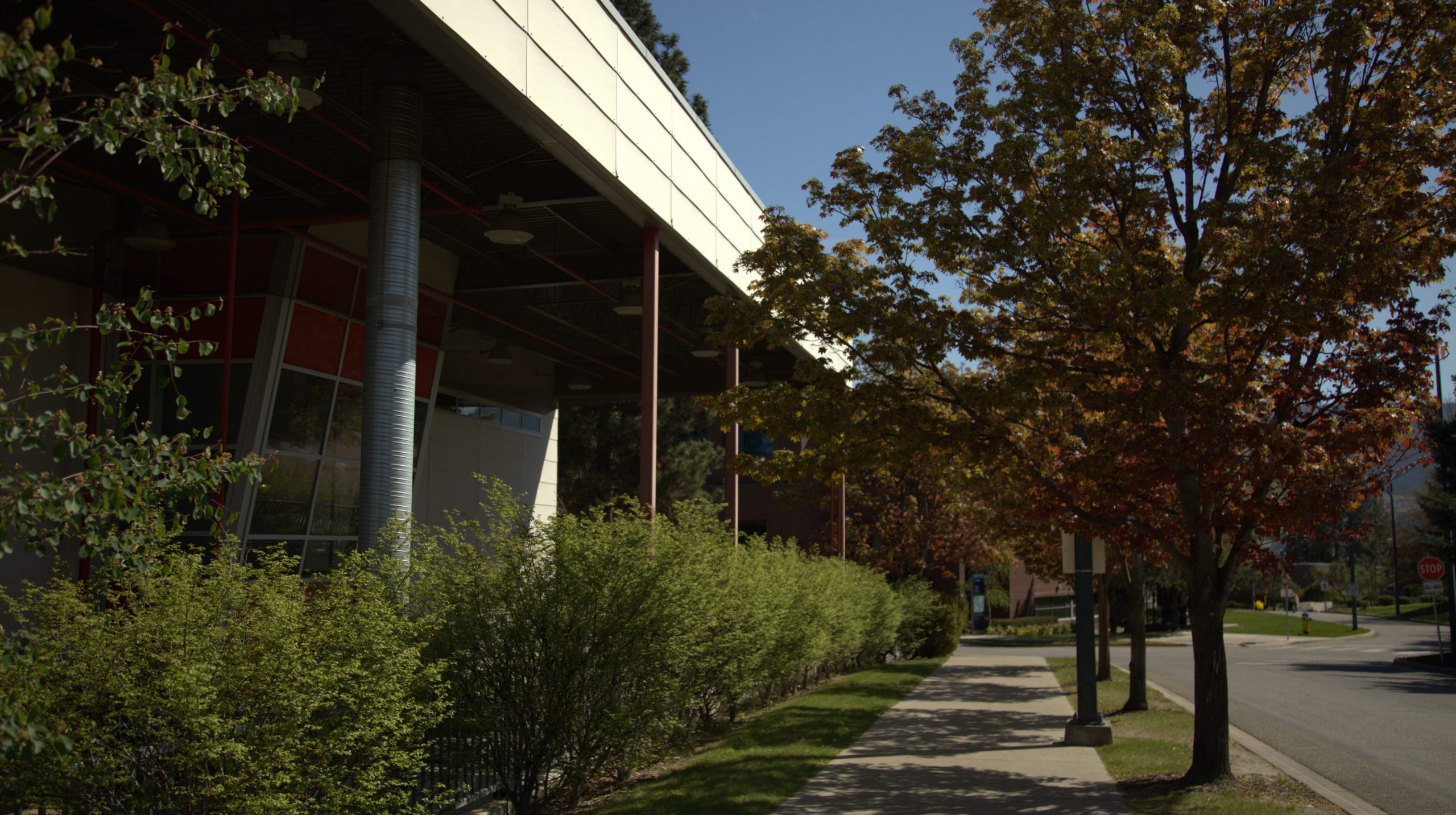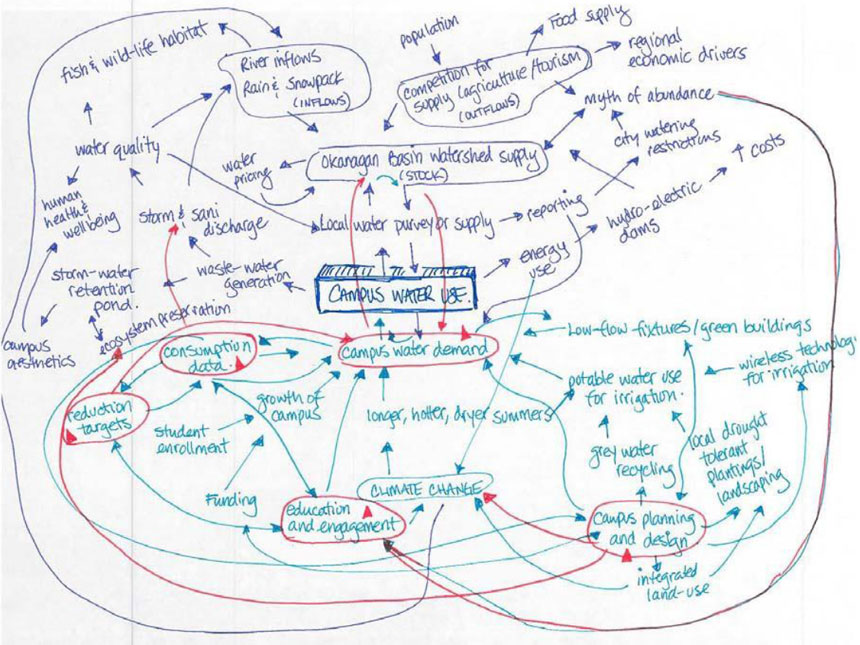Whole Systems Infrastructure Plan

Integrated planning for a resilient, sustainable campus.
The Whole Systems Infrastructure Plan (WSIP) is UBC Okanagan’s roadmap for sustainable campus development. It integrates planning across energy, water, waste, ecology and infrastructure to guide long-term growth while enhancing environmental performance, resilience and community wellbeing.
2050 goals
By identifying the connections between systems—such as carbon, landscape and biodiversity—the WSIP provides a framework that supports sustainability goals and protects environmental health as the campus evolves. The WSIP 2050 goals are:
- Net-positive operational energy and carbon performance.
- Framework for low embodied carbon in future development.
- Optimized water quality, supply, and security.
- 100 per cent diversion of stormwater from municipal systems.
- Enhanced campus ecology and biodiversity.
Official documents and resources
- WSIP summary (PDF)
- WSIP, Part 1 (PDF)
- WSIP, Part 2 PDFs below:
- UBCO Whole Systems Pathway to Performance (PDF)
Reference Documents
Implementation
WSIP implementation is translated into strategy and sustainable actions that guide UBC Okanagan’s sustainable development by integrating energy, water, ecology and infrastructure planning.
- Energy and carbon: Demand-side management initiatives, district energy system optimization and renewable energy integration.
- Water and stormwater: Integrated rainwater management and water conservation strategies.
- Ecology and biodiversity: Landscape enhancements and habitat restoration projects.
- Technological enhancements: Upgrading building systems and infrastructure for improved performance.
- Organizational initiatives: Aligning policies and governance structures to support sustainability goals.
- Behavioural engagement: Encouraging campus-wide participation in resource conservation efforts.
Key Initiatives:
- Developed a dedicated energy team to support the implementation of the Whole Systems Infrastructure Plan.
- Developed a campus-wide Behaviour Change Engagement Strategy (the Power of You) to promote and support campus awareness for resource conservation and DSM strategies.
- Implemented Energy Conservation Measures in academic buildings.
- Developed and implemented a five-year Strategic Energy Management Plan.
- Continued re-commissioning efforts on campus to improve existing building operations.
- Expanded the district energy system and added a cooling tower to the geo-exchange facilities for additional heat rejection.
- Updated UBCO’s Technical Guidelines with guidance for energy performance of new construction and energy-efficient systems.
- Developed a campus-wide Behaviour Change Engagement Strategy (the Power of You) to promote and support campus resource conservation.
- Updated UBCO’s Technical Guidelines for expected water performance of new construction and existing building upgrades.
- Continued to phase in planned drip irrigation program (five-year plan), which includes recommendations for xeriscaping the campus landscape.
- Completed development of the Integrated Rainwater Management Plan (2017), which supports low-impact site retention strategies such as rain gardens and native plantings.
- Explore more information about campus ecology and landscape.
- Completed development of the Integrated Rainwater Management Plan (2017), which addresses rainfall capture, infiltration, and wetland creation, and integration of LID methods.
Whole Systems Thinking
Whole Systems Thinking is a method to understand how elements and systems are related, and how they influence one another within a whole. An example of systems thinking is how elements like water, sun, soil, air, plants, animals and human beings interact and support one another as a system.
At UBC Okanagan, this approach informs sustainable campus planning by considering the complex relationships between environmental, social and economic factors.
Key concepts
Recognizing that components like buildings, landscapes and communities are part of an integrated whole.
Understanding how actions in one area can have ripple effects throughout the system.
Identifying strategic areas where targeted interventions can lead to significant positive change.

Campus Water Use Systems Map: The hand-drawn systems map explores elements and systems that impact—and are impacted by—campus water use. Leanne Bilodeau, June 6, 2014
By applying Whole Systems Thinking, UBC Okanagan aims to create a resilient and regenerative campus environment that not only minimizes negative impacts but also contributes positively to the broader ecosystem.
Whole systems design
Optimizes the performance of buildings and infrastructure by considering their connections and interdependencies.
Encourages interdisciplinary collaboration, helping diverse teams understand how components function together and uncover synergies between systems.
Focuses on system-wide solutions, aiming to enhance the entire system rather than isolated parts—an essential principle of integrative design.
Delivers multiple benefits from a single action, solving several problems at once and generating broad, distributed value.
Monitoring, reporting and updates
The WSIP is a living document, shaped by ongoing input and changing campus needs. Progress is monitored annually through sustainability reporting, helping track performance, guide updates and ensuring transparency. This process involves collaboration across UBC Okanagan units and aligns with broader campus planning reviews.
Get involved
To see the WSIP in action and learn how you can contribute to a sustainable campus, explore our Power of You programs and keep an eye out for future events.